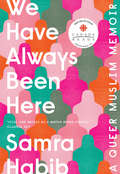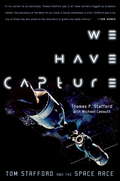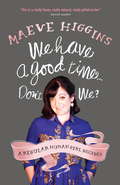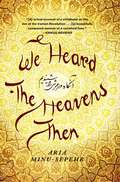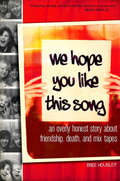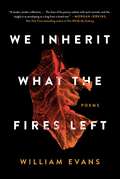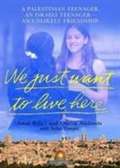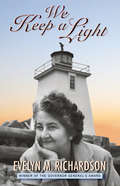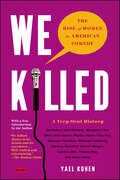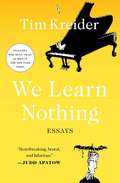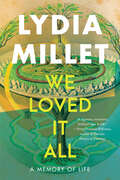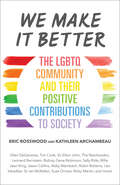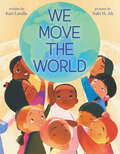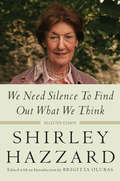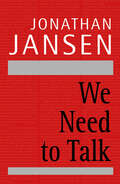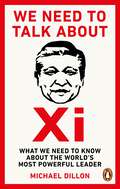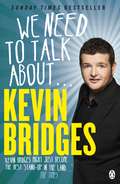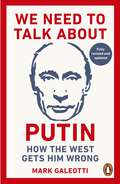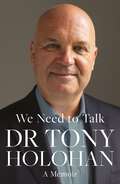- Table View
- List View
We Have Always Been Here: A Queer Muslim Memoir
by Samra HabibHow do you find yourself when the world tells you that you don't exist? <P><P>Samra Habib has spent most of her life searching for the safety to be herself. As an Ahmadi Muslim growing up in Pakistan, she faced regular threats from Islamic extremists who believed the small, dynamic sect to be blasphemous. From her parents, she internalized the lesson that revealing her identity could put her in grave danger. <P><P>When her family came to Canada as refugees, Samra encountered a whole new host of challenges: bullies, racism, the threat of poverty, and an arranged marriage. Backed into a corner, her need for a safe space--in which to grow and nurture her creative, feminist spirit--became dire. The men in her life wanted to police her, the women in her life had only shown her the example of pious obedience, and her body was a problem to be solved. <P><P>So begins an exploration of faith, art, love, and queer sexuality, a journey that takes her to the far reaches of the globe to uncover a truth that was within her all along. A triumphant memoir of forgiveness and family, both chosen and not, We Have Always Been Here is a rallying cry for anyone who has ever felt out of place and a testament to the power of fearlessly inhabiting one's truest self.
We Have Capture
by Michael Cassutt Thomas P. StaffordWhat an amazing career. Tom Stafford attained the highest speed ever reached by a test pilot (28,547 mph), carried a cosmonaut's coffin with Soviet Secretary Leonid Brezhnev, led the team that designed the sequence of missions leading to the original lunar landing, and drafted the original specifications for the B-2 stealth bomber on a piece of hotel stationery. But his crowning achievement was surely his role as America's unofficial space ambassador to the Soviet Union during the darkest days of the Cold War.In this lively memoir written with Michael Cassutt, Stafford begins by recounting his early successes as a test pilot, Gemini and Apollo astronaut, and USAF general. As President Nixon's stand-in at the 1971 Soviet funeral for three cosmonauts, he opened the door to the possibility of cooperation in space between Russians and Americans. Stafford's Apollo-Soyuz team was the first group of Americans to work at the cosmonaut training center, and also the first to visit Baikonur, the top-secret Soviet launch center, in 1974. His 17 July 1975 "handshake in space" with Soviet commander Alexei Leonov (who became a lifelong friend) proved to the world that the two opposing countries could indeed work successfully together. Stafford has continued in this leadership role right up to the present, participating in designing and evaluating the Space Shuttle, Mir, and the International Space Station. He is truly an American hero who personifies the broadest spirit of exploration and cooperation.
We Have a Good Time ... Don't We?: A Regular Human Girl Decides
by Maeve HigginsIn her hilarious debut, Maeve Higgins smashes the brittle veneer on the creme brulée of life and hands around spoons, so we can all taste the delicious absurdity that lies beneath. She then promises to stop making terrible food analogies about everything.From terrifying hen nights, malevolent dolphins and angry bakers, to runaway cats, a stalker who won't commit and the curse of over-politeness, Maeve writes with warmth and wit about what it's like to be a regular human girl. We Have a Good Time...Don't We? introduces a strikingly original voice that celebrates the truth of what we really feel about ourselves through these hilarious and perceptive snapshots of life.
We Have a Good Time ... Don't We?: A Regular Human Girl Decides
by Maeve HigginsIn her hilarious debut, Maeve Higgins smashes the brittle veneer on the creme brulée of life and hands around spoons, so we can all taste the delicious absurdity that lies beneath. She then promises to stop making terrible food analogies about everything.From terrifying hen nights, malevolent dolphins and angry bakers, to runaway cats, a stalker who won't commit and the curse of over-politeness, Maeve writes with warmth and wit about what it's like to be a regular human girl. We Have a Good Time...Don't We? introduces a strikingly original voice that celebrates the truth of what we really feel about ourselves through these hilarious and perceptive snapshots of life.
We Heard the Heavens Then
by Aria Minu-SepehrARIA MINU-SEPEHR was raised in a sheltered world of extraordinary privilege as the son of a major general in the Shah's Imperial Iranian Air Force. It seemed his father could do anything--lead the Golden Crowns in death-defying aerobatic maneuvers; command an air force unit using top American technology; commission a lake to be built on a desert military base, for waterskiing. When Aria was eight, "Baba" built him a dune buggy so he could explore the desert; by ten, the boy handled the controls of a Beechcraft Bonanza while his father napped in the copilot's seat. Aria moved easily between the two distinct worlds that existed under his family's roof--a division that mirrored the nation's own deep and brooding divide. He was as comfortable at the lavish cocktail parties his parents threw for Iran's elite as he was running amok in the kitchen where his beloved nanny grumbled about the whiskey drinking, French ham, and miniskirts. The 1970s were the end result of half a century of Westernization in Iran, and Aria's father was the man of the hour. But when the Shah was overthrown and the Ayatollah rose to power in 1979, Aria's idyllic life skidded to a halt. Days spent practicing calligraphy in his father's embrace, lovingly torturing his nanny, and watching Sesame Street after school were suddenly infused with fears that the militia would invade his home, that he himself could be kidnapped, or that he would have to fire a gun to save Baba's life. As the surreal began to invade the mundane, with family friends disappearing every day and resources growing scarce, Aria found himself torn between being the man of the house and being a much needed source of comic relief. His antics shone a bright light for his family, showing them how to escape, if only momentarily, the grief and horror that a vengeful revolution brought into their lives. We Heard the Heavens Then is a deeply moving story told from two vantage points: a boy growing up faster than any child should, observing and recoiling in the moment, and the adult who is dedicated to a measured assessment of the events that shaped him. In this tightly focused memoir, Aria Minu- Sepehr takes us back through his explosive youth, into the heart of the revolution when a boy's hero, held up as the nation's pride, became a hunted man.
We Hope You Like This Song: An Overly Honest Story about Friendship, Death, and Mix Tapes
by Bree HousleyFrom fourth grade onward, shy, nervous Bree Housley and fearless, outgoing Shelly were an inseparable, albeit unlikely, pair. Their friendship survived everything from the awkward years of junior high to the transformative upheavals of early adulthood-until, at the young age of 25, Shelly lost her life to complications caused by Preeclampsia. We Hope You Like This Songis a tribute to the ineffable, incomparable bond that we call friendship, and a celebration of living life to the fullest. Housley recounts how she and her sister found a way to keep Shelly’s memory alive-by spending a year doing crazy things that Shelly would have done, like giving Valentines to strangers, singing at a karaoke bar, and letting her boyfriend pick out her outfits for a week. In the process, she paints a vivid, often hilarious, portrait of her fun-loving, social butterfly best friend and the many adventures they had growing up together in '80s and ’90s small-town America. Sweet, poignant, and yet somehow laugh-out-loud funny,We Hope You Like This Songis a touching story of love, loss, and the honoring of a friendship after it’s gone.
We Inherit What the Fires Left: Poems
by William EvansWilliam Evans, the award-winning poet and cofounder of the popular culture website Black Nerd Problems, offers an emotionally vulnerable poetry collection exploring the themes of inheritances, dreams, and injuries that are passed down from one generation to the next and delving into the lived experience of a black man in the American suburbs today.In We Inherit What the Fires Left, award-winning poet William Evans embarks on a powerful new collection that explores the lived experience of race in the American suburbs and what dreams and injuries are passed from generation to generation. Fall under the spell of Evans&’s boldly intimate, wise, and emotionally candid voice in these urgent, electrifying poems. This eloquent collection explores not only what these inheritances are composed of, but what price the bearer must pay for such legacies, and the costly tolls exacted on both body and spirit. Evans writes searingly from the perspective of the marginalized, delivering an unflinching examination of what it is like to be a black man raising a daughter in predominantly white spaces, and the struggle to build a home and a future while carrying the weight of the past. However, in beautiful and quiet scenes of domesticity with his daughter or in thoughtful reflection within himself, Evans offers words of hope to readers, proving that resilience can ultimately bloom even in the face of prejudice. Readers of Ta-Nehisi Coates and Hanif Abdurraqib will find a brilliant, fresh new talent to add to their lists in William Evans.
We Just Want To Live Here
by Amal Rifa'I Odelia Ainbinder Sylke TempelPalestinian Amal Rifa'i and Israeli Odelia Ainbinder are two teenage girls who live in the same city, yet worlds apart. They met on a student exchange program to Switzerland. Weeks after they returned, the latest, violent Intifada broke out in the fall of 2000. But two years later, Middle East correspondent Sylke Tempel encouraged Amal and Odelia to develop their friendship by facilitating an exchange of their deepest feelings through letters. In their letters, Amal and Odelia discuss the Intifada, their families, traditions, suicide bombers, and military service. They write frankly of their anger, frustrations, and fear, but also of their hopes and dreams for a brighter future.
We Keep a Light
by Evelyn RichardsonIn this classic memoir of life in rural Nova Scotia, a woman recounts her family&’s experiences running a lighthouse station on their own island. In We Keep A Light, Evelyn M. Richardson describes how she and her husband bought tiny Bon Portage Island and built a happy life there for themselves and their three children. On an isolated lighthouse station off the southern tip of Nova Scotia, the Richardsons shared the responsibilities and pleasures of island living, from carrying water and collecting firewood to making preserves and studying at home. The close-knit family didn&’t mind their isolation. Instead, they found delight in the variety and beauty of island life. We Keep A Light is much more than a memoir. It is an exquisitely written, engrossing record of family life set against a glowing lighthouse, the enduring shores of Nova Scotia, and the ever-changing sea.
We Killed: The Rise of Women in American Comedy
by Yael KohenNo matter how many times female comedians buck the conventional wisdom, people continue to ask: "Are women funny?" The question has been nagging at women off and on (mostly on) for the past sixty years. It's incendiary, much discussed, and, as proven in Yael Kohen's fascinating oral history, totally wrongheaded.In We Killed, Kohen pieces together the revolution that happened to (and by) women in American comedy, gathering the country's most prominent comediennes and the writers, producers, nightclub owners, and colleagues who revolved around them. She starts in the 1950s, when comic success meant ridiculing and desexualizing yourself; when Joan Rivers and Phyllis Diller emerged as America's favorite frustrated ladies; when the joke was always on them. Kohen brings us into the sixties and seventies, when the appearance of smart, edgy comedians (Elaine May, Lily Tomlin) and the women's movement brought a new wave of radicals: the women of SNL, tough-ass stand-ups, and a more independent breed on TV (Mary Tyler Moore and her sisters). There were battles to fight and preconceptions to shake before we could arrive in a world in which women like Chelsea Handler, Sarah Silverman, and Tina Fey can be smart, attractive, sexually confident—and, most of all, flat-out funny.As the more than 150 people interviewed for this riveting oral history make clear, women have always been funny. It's just that every success has been called an exception and every failure an example of the rule. And as each generation of women has developed its own style of comedy, the coups of the previous era are washed away and a new set of challenges arises. But the result is the same: They kill. A chorus of creative voices and hilarious storytelling, We Killed is essential cultural and social history, and—as it should be!—great entertainment.
We Learn Nothing: Essays and Cartoons
by Tim Kreider“Kreider locates the right simile and the pith of situations as he carefully catalogues humanity’s inventive and manifold ways of failing” (Publishers Weekly, starred review).In We Learn Nothing, satirical cartoonist Tim Kreider turns his funny, brutally honest eye to the dark truths of the human condition, asking big questions about human-sized problems: What if you survive a brush with death and it doesn’t change you? Why do we fall in love with people we don’t even like? How do you react when someone you’ve known for years unexpectedly changes genders? With a perfect combination of humor and pathos, these essays, peppered with Kreider’s signature cartoons, leave us with newfound wisdom and a unique prism through which to examine our own chaotic journeys through life. These are the conversations you have only with best friends or total strangers, late at night over drinks, near closing time. This edition also includes the sensationally popular essay “The Busy Trap,” as seen in the New York Times.
We Love the 90s!
by Emily SteadDiscover everything you need to know about your favourite decade - the 1990s!From bum bags, boybands and Britpop via grunge, girl bands and Home Alone, this book will make you the greatest 90s expert ever.With an ultimate 1990s quiz at the end of the book.Full colour photography throughout.
We Loved It All: A Memory of Life
by Lydia MilletA Time Must-Read Book of 2024 • A Booklist Editors' Choice • A Washington Post Notable Nonfiction Book of 2024 "A rigorous, evocative, brilliant bow to life." —Terry Tempest Williams, author of Erosion: Essays of Undoing This lucent anti-memoir from celebrated novelist Lydia Millet explores the pain and joy of being a parent, child, and human at a moment when the richness of the planet’s life is deeply threatened. Across more than a dozen acclaimed works of fiction, readers have become intimate with Lydia Millet’s distinctive voice and sly wit. We Loved It All, her first nonfiction book, combines the precision of fact with the power of narrative to evoke our enmeshment with the more-than-human world. Emerging from Millet’s quarter century of wildlife and climate advocacy, We Loved it All marries scenes from her life with moments of nearness to “the others”— the animals and plants with whom we share the earth. Accounts of fears and failures, jobs and friendships, childhood and motherhood are interspersed with exquisite accounts of nonhumans and arresting meditations on the power of story to shape the future. Seeking to understand why we immerse ourselves in the domestic and immediate, turning away from more sweeping views, she examines how grand cultural myths can deny our longing for the company of nature and deprive us of its charisma and inspiration. In a thrilling distillation of experience and emotion, she evinces the familiar sense of feeling both well-meaning and powerless—a creature subject to forces that are baffling in their immensity. The fear and grief of extinction and climate change, Millet suggests, are forms of love that might be turned to resistance. We Loved It All shimmers with curiosity and laconic humor yet addresses with reverence the most urgent crises of our day. An incantatory, bewitching devotional to the vast and precious bestiary of the earth, it asks that we extend to other living beings the protection they deserve—the simple grace of continued existence.
We Make It Better: The LGBTQ Community and Their Positive Contributions to Society
by Eric Rosswood Kathleen Archambeau&“For all LGBTQ teens and young adults, this book will help inspire and empower you to become your best selves.&” —Dustin Lance Black, Academy Award-winning screenwriter, Milk LGBT history is as old as history itself. We Make It Better profiles people, places, and events that show just how awesome and inspiring the LGBT community is. They have served their country, served in office, pushed for the protection of human rights, and impacted all fields of study, sport, art and industry. We Make It Better offers biographies of some of the most famous thinkers and changers in history from Bayard Rustin, Alan Turing, Dr. Sally Ride, and Oscar Wilde to present-day innovators and world-changers such as Billie Jean King, Jason Collins, Ellen DeGeneres, Tim Cook, the Wachowski sisters, Sir Ian McKellen and more. But more than a &“who&’s who&” of LGBT history, We Make It Better is also a vibrant chronicle of the events in history in which the LGBT community came together to fight for equality and to save lives. Learn how they united during the HIV/AIDs crisis, fought for marriage equality, protested discrimination, and pushed for progressive change throughout the years. Places and cultures important to the LGBT community are also proudly profiled in this enlightening mix of biographies, history, and memorable quotes.Includes photos
We Might Just Make It After All: My Best Friendship with Kate Spade
by Elyce AronsNEW YORK TIMES BESTSELLER A moving portrait of friendship by Elyce Arons as she reflects on her long relationship with Kate Spade, whom she met in college and with whom she cofounded the multi-billion-dollar fashion company as they came of age in 1990s New York.When Elyce Arons first met Katy Brosnahan in a University of Kansas dorm room, she had no idea that this polo shirt–wearing Missouri girl would not only become her best friend but also change the course of her life. Back then, Katy and Elyce were preoccupied with frat parties and The Mary Tyler Moore Show; within a decade, they&’d be scraping by in New York City, working day jobs to spend nights building a new line of handbags that would one day revolutionize the accessories industry. We Might Just Make It After All brings us on the rollercoaster of adventures (and misadventures) that the best friends embarked on, from transferring colleges on a whim, to falling in and out of love with suitors, cramming into roach-infested Hell&’s Kitchen apartments, and eventually designing the chic, simple bag that would launch the pair to global fame. Through it all, Katy and Elyce&’s friendship remained unshakeable. This powerful friendship lasted nearly forty years, until Katy&’s tragic suicide in 2018. We Might Just Make It After All celebrates her legacy as a cultural icon and loyal friend. Set against the glitzy and gritty backdrop of downtown New York at the turn of the century, We Might Just Make It After All lovingly and candidly explores the power of a friendship as close as sisterhood, the challenges facing women entrepreneurs in the 1990s, and the timeless elegance of a generation-defining brand.
We Move the World
by Kari LavelleAn inspiring and empowering picture book about the small things kids do that have the potential to change the world! Meet some of the world’s most beloved movers, shakers, scientists, activists, dreamers, and doers from the past and present who model what every childhood first can lead to! Neil Armstrong, Misty Copeland, Ruth Bader Ginsburg, and more were once kids—they grew up to lead us to the moon, dance in the ballet, and break barriers.From first steps to solving puzzles and learning the alphabet, all the small things are only the beginning: they can lead to future activism and innovation that just might change the world! Featuring fresh and accessible text paired with vibrant illustrations, We Move the World gives young readers a chance to see how much is possible just because of the things they already do. Includes robust backmatter that gives further context on each figure and historical moment, including the most recent COVID-19 pandemic.
We Need Silence to Find Out What We Think: Selected Essays
by Shirley HazzardSpanning the 1960s to the 2000s, these nonfiction writings showcase Shirley Hazzard's extensive thinking on global politics, international relations, the history and fraught present of Western literary culture, and postwar life in Europe and Asia. They add essential clarity to the themes that dominate her award-winning fiction and expand the intellectual registers in which her writings work.Hazzard writes about her employment at the United Nations and the institution's manifold failings. She shares her personal experience with the aftermath of the Hiroshima atomic bombing and the nature of life in late-1940s Hong Kong. She speaks to the decline of the hero as a public figure in Western literature and affirms the ongoing power of fiction to console, inspire, and direct human life, despite—or maybe because of—the world's disheartening realities. Cementing Hazzard's place as one of the twentieth century's sharpest and most versatile thinkers, this collection also encapsulates for readers the critical events defining postwar letters, thought, and politics.
We Need To Talk
by Stephen Webb Chris SteedChris and Stephen off Gogglebox are known and loved by millions of viewers for their outrageous humour, filthy language and adorable sausage dogs. But there's a lot more to them than that. The ex-partners have both had their fair share of ups and downs, and here in their joint memoir they carry us through their experiences on a wave of hilarious back-and-forth conversations and killer one-liners. From their childhoods to finding fame on Gogglebox, nothing is off-limits.Stephen: "Going to the allotment was something we'd look forward to. Especially when it got dark and we used to nick everyone's vegetables"Chris: "We lived in this flint house on the edge of the cemetery, and not surprisingly it was really haunted."Funny, frank and pretty ridiculous, this is the perfect book for any Gogglebox fan.
We Need To Talk
by Stephen Webb Chris SteedChris and Stephen off Gogglebox are known and loved by millions of viewers for their outrageous humour, filthy language and adorable sausage dogs. But there's a lot more to them than that. The ex-partners have both had their fair share of ups and downs, and here in their joint memoir they carry us through their experiences on a wave of hilarious back-and-forth conversations and killer one-liners. From their childhoods to finding fame on Gogglebox, nothing is off-limits.Stephen: "Going to the allotment was something we'd look forward to. Especially when it got dark and we used to nick everyone's vegetables"Chris: "We lived in this flint house on the edge of the cemetery, and not surprisingly it was really haunted."Funny, frank and pretty ridiculous, this is the perfect book for any Gogglebox fan.
We Need To Talk
by Stephen Webb Chris SteedChris and Stephen off Gogglebox are known and loved by millions of viewers for their outrageous humour, filthy language and adorable sausage dogs. But there's a lot more to them than that. The ex-partners have both had their fair share of ups and downs, and here in their joint memoir they carry us through their experiences on a wave of hilarious back-and-forth conversations and killer one-liners. From their childhoods:(Stephen: "Going to allotment was something we'd look forward to. Especially when it got dark and we used to nick everyone's vegetables"Chris: "We lived in this flint house on the edge of the cemetery, and not surprisingly it was really haunted.")To finding fame on Gogglebox, nothing is off-limits.Funny, frank and pretty ridiculous, this is the perfect book for any Gogglebox fan.(P)2016 Headline Digital
We Need To Talk About Xi: What we need to know about the world’s most powerful leader
by Michael DillonMeet the most powerful leader in the world. Chinese premier Xi Jinping graces our television screens and news headlines on a regular basis. But even after a decade in power, he remains shrouded in mystery.From growing up with a father purged in Mao's Cultural Revolution and his mission to eradicate poverty, to his persecution of Uyghur Muslims and paranoia about being likened to Winnie-the-Pooh, Xi Jinping is a man obscured by caricatures. In this short, essential primer, historian and writer Michael Dillon unveils the character of Xi Jinping - arguably the world's most powerful man - to truly understand his grip on China, what he wants and how the West gets him wrong.But this is not just the story of Xi; this is the story of today's largest economic powerhouse, which dives into the crux of the issue - what does Xi's leadership of China mean for the rest of the world, and what will he do next?
We Need to Talk About . . . Kevin Bridges
by Kevin BridgesThe comic autobiography of 2014 A comedian's autobiography? I wonder if he's ever used humour to deflect from his insecurities? To avoid being bullied? Is there heartache behind the humour? I wonder if he's a manic-depressive? Tears of a clown? Yes, all of that. Discover the hilarious life-story of one of Britain's best-loved comedians in Kevin Bridges' brilliant memoir. 'First of all, I have never written a book before, you probably haven't either, so there we have it; a connection is established between reader and writer . . .' Aged just 17, Kevin Bridges walked on stage for the first time in a Glasgow comedy club and brought the house down. He only had a five-minute set but in that short time he discovered that he really could earn a living from making people laugh. Kevin began life as a shy, nerve-ridden school-boy, whose weekly highlights included a cake-bombing attack by the local youths. Reaching his teens, he followed his true calling as the class clown, and was soon after arrested for kidnapping Hugh Grant from his local cinema on a quiet Saturday night. This was a guy going somewhere - off the rails seeming most likely. Kevin's trademark social commentary, sharp one-liners and laugh-out-loud humour blend with his reflections on his Glaswegian childhood and the journey he's taken to become one of the most-loved comedians of our time.'. . . Hopefully now you'll take this over to the till and I can accompany you for the next wee while. That's the benefit of book shops, reading the little bit and then deciding if the author deserves to be part of your carefully selected 3 for 2 deal, or part of your plane journey, train journey, your next bath, your next shite.' Praise for Kevin Bridges:'The Best Scottish Stand up of his Generation.' The Scotsman 'A wonderfully dry and deadpan Glaswegian comic . . . one the most exciting talents to have emerged from Scotland since Billy Connolly' Guardian 'Kevin Bridges might just become the best stand-up in the land . . . he will go and deliver a one-liner that you want to jot down and frame' The Times 'Wonderfully sharp, assured stand-up from the preternaturally gifted young comic' Independent
We Need to Talk About Putin: How the West gets him wrong
by Mark GaleottiMeet the world's most dangerous man. Who is the real Vladimir Putin? What does he want? And what will he do next?Despite the millions of words written on Putin's Russia, the West still fails to truly understand one of the world's most powerful politicians, whose influence spans the globe and whose networks of power reach into the very heart of our daily lives.Professor Mark Galeotti uncovers the man behind the myth, addressing the key misperceptions of Putin and explaining how we can decipher his motivations and next moves. From Putin's early life in the KGB, to the war with Ukraine, his real relationship with the US and his vision for the future of Russia - Galeotti draws on Russian sources and explosive unpublished accounts to give unparalleled insight into the man at the heart of global politics.'Easily the shrewdest and most insightful analysis yet of Putin’s policymaking' - Foreign Affairs'Punchy and highly readable' - TLS'Reads like a primer for anyone poised to enter a negotiation with the Russian president' - The Guardian
We Need to Talk: A Memoir
by Tony HolohanChief Medical Officer Shares His Covid Story Follow Dr. Tony Holohan’s journey as a public figure combating the pandemic during his own period of grief. Leading Ireland through the coronavirus. 12 years as the Chief Medical Officer had never prepared Dr. Holohan for an outbreak like coronavirus pandemic. Thrust into the spotlight as the leader of frontline healthcare workers, he found himself responsible for bringing Ireland through the biggest health crisis in modern history. Now, Dr. Holohan is sharing his story. We Need to Talk is a COVID-19 book retelling the difficult truths that came with navigating a country through a traumatic global crisis. Featuring exclusive access into the decisions that impacted the rise of COVID-19 cases, discover how perseverance and empathy helped Ireland through it all to our post-pandemic world. Taking the time to cherish meaningful experiences.We Need to Talk is a medical memoir dedicated to not only Dr. Tony Holohan’s role during the pandemic, but also the life and loss of his wife, Emer. Sharing her story of battling multiple myeloma for nearly a decade, he recalls their beautiful moments together and with their family before Emer’s last days. With difficult discussions about mourning while moving forward, Dr. Holohan shares the importance of rediscovering those happy memories together after saying goodbye. Also inside: Dr. Holohan’s path to becoming Ireland’s Chief Medical Officer Leading the National Public Health Emergency Team (NPHET) Making the decision to step back to spend time with his loved ones Life after the pandemic and resignation If you liked The People’s Hospital, In Love, or Loving and Living Your Way Through Grief, then you will love We Need to Talk.
